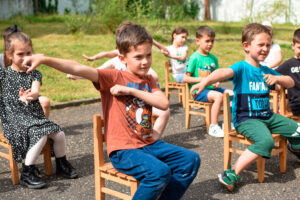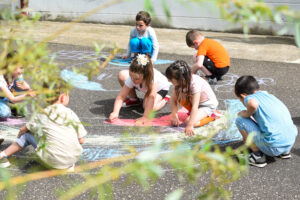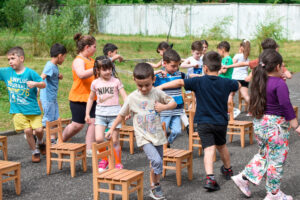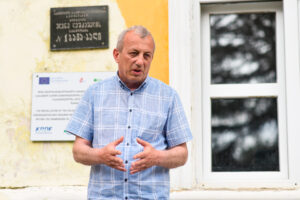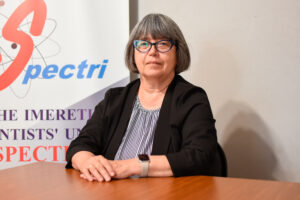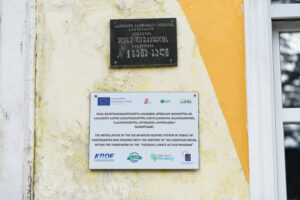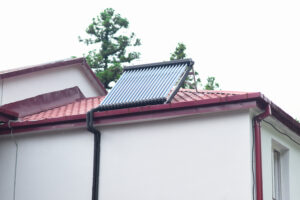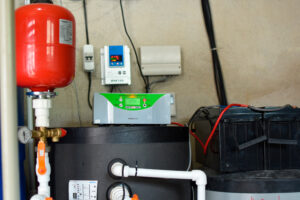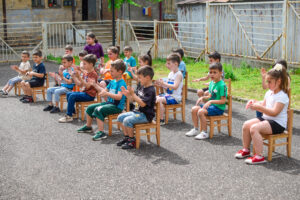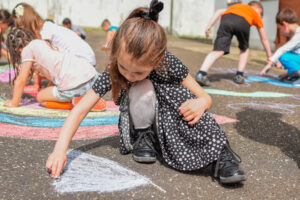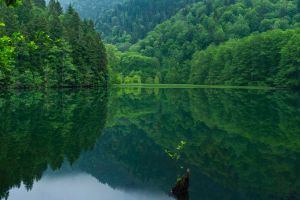
From sunshine to hot water: how solar energy has transformed Tkibuli Kindergarten No. 1
A reliable supply of hot water is essential, but expensive and often challenging in the remote mountainous areas of Georgia. Now, however, the thousand or so children at Kindergarten No. 1 in Tkibuli, an old mining town in central Georgia, have access to cheap and regular hot water using solar energy, thanks to the efforts of local environmentalists and the financial support of the EU.
Reduced gas bills = more money for kids
Before, the Tkibuli Kindergarten needed expensive natural gas for its hot water. Now, the new Helio solar power system covers part of the energy needs, with much less gas required and lower bills as a result.
The money saved is used for children’s needs, allowing the kindergarten to buy more toys, special items targeted at improving their skills and to provide everything the children need for their development.
This has been made possible through the project ‘Promoting the Use of Solar Energy in Tkibuli Municipality’ – a component of the EU-funded ‘Georgia Climate Action Project (GEO-CAP): Promoting Civil Society Engagement in Climate Change Policy Design and Implementation’, implemented by CENN, the Caucasus Environmental NGO Network.
The action in Tkibuli has been undertaken by the Imereti Scientists Union ‘Spectri’ and the Tkibuli District Development Fund (TDDF).
Raising awareness on environmental issues in Imereti
Against the background of the economic disarray of the 1990s, environmental issues began to come to the fore in Georgia. In response to this and other challenges, and to raise awareness among the population, scientists and academics in the region joined together and established the Imereti Scientists Union ‘Spectri’.
“We – the people with considerable experience in teaching and education – united around a common idea,” says Ketevan Tskhakaia, CEO of ‘Spectri’, and associate professor at the Akaki Tsereteli State University.
Solar energy resources to help Tkibuli
Tkibuli is a city of miners. The mining industry is a major polluter contributing to climate change. To tackle the existing problems, the local Municipality responded by developing an environmental action plan.
Under the Municipality’s additional action plan, ‘Spectri’ cooperates with the Tkibuli District Development Fund (TDDF), whose work is mainly focused on the improvement of the social and economic situation of the local community, and the implementation of projects in the field of environmental protection.
“We try to make people realise that Tkibuli is something more than simply the coal and the mining industry. So, we started implementing a number of projects,” says Zaza Gochelashvili, CEO of TDDF. “We would like people to understand that society can receive far greater benefits by using solar energy and other renewable sources of energy.”
The director of TDDF believes that when it comes to the environment, Tkibuli is one of the most vulnerable municipalities in the country.
“We inflicted so much damage on nature and the environment that each of us must contribute to do something favourable and help to mitigate the situation,” says Zaza Gochelashvili, adding: “Snow was a normal climatic event for us, but for the last 7-8 years we have not seen any snow here at all.”
A kindergarten heated by solar energy
“Use of solar energy is a very important climate action to reduce greenhouse gas emissions and in general, to raise awareness in society,” says Ketavan Tskhakaia.
Apart from raising awareness, the project also focuses on practical results. The most tangible result of the joint work is using solar energy to heat the water supplied to Tkibuli’s largest kindergarten – Nursery-Kindergarten No.1 named after Elene Leshkasheli.
“Together with other partners, we decided to do one more favour to Tkibuli,” says Ketevan Tskhakaia.
How does the hot water solar system operate?
The solar heating system consists of two components: a solar collector for hot water supply and a solar panel for autonomous supply of electricity.
“This makes the system more stable and sustainable,” the CEO of ‘Spectri’ explains.
The panel uses solar energy to generate electric power. It ensures an autonomous electricity supply, i.e., it makes the system work even when the power supply is off. Simultaneously, generated power may be used either for the hot water collector, or for anything else, such as lighting.
The system does not ensure hot water supply independently – it helps the main system that works on the natural gas and supplies hot water.
As the system is autonomous, it works in any season, weather, or conditions, though the solar panel generates more electric power in summer and in sunny weather.
Raising awareness through tangible actions
Environmental protection is one of the main activities of the Imereti Scientists Union. The team has considerable experience in the field, and has implemented about 50 projects so far.
“We are now working to transfer our experience to other municipalities. We have a huge experience. In Kutaisi, we became the first city in Georgia where separated collection of plastic began in 2015 at municipality level,” says Ketevan Tskhakaia.
‘Spectri’ also worked to open a composting centre in Kutaisi. All branches, leaves, grass, and other green waste collected in the city are taken to a centre where they are processed by specialised machinery.
“The result is tangible. Green mass collected around the city comes in every day,” explains the CEO of ‘Spectri’, “Waste does not go to the dump site. This means that no greenhouse gases are generated there. On the other hand, the composted product is then used as fertilizer.”
The Composting Centre also often hosts schoolchildren to raise their awareness.
“You cannot show them anything better. You show the children what can be produced from the waste thrown away into the environment,” says Ketevan Tskhakaia.
Awareness-raising brochures have also been prepared under the CENN project ‘Promoting the Use of Solar Energy in Tkibuli Municipality’. ‘Spectri’ provides information to children in a fun form, including topic-based activities.
The Tkibuli District Development Fund (TDDF) is also enthusiastic about the development of the new generation and raising their awareness. Zaza Gochelashvili, CEO of TDDF says empowering younger generations is one of the project’s main priorities.
The organisation works on improving civil, social, leadership and similar skills among youth. Informal education and volunteering are also important topics. Under the project on promoting the use of solar energy, they have trained volunteers, schoolchildren who then shared their knowledge on renewables to their peers at school. A contest on the topic of energy efficiency was also held, where young people generated many good ideas on the use of alternative energy sources.
Both organisations actively continue their work. It ‘s summer now and it’s warm in Tkibuli, so even more cost savings are expected in the kindergarten.
Overall, one thing is clear: thanks to this initiative, the kindergarten not only prepares the children for life, but also turns them into small parts of something that defines the future of our planet.
Author: Mariam Ramazashvili
Article published in Georgian by On.ge
MOST READ
SEE ALSO

No, time is not on Russia‘s side
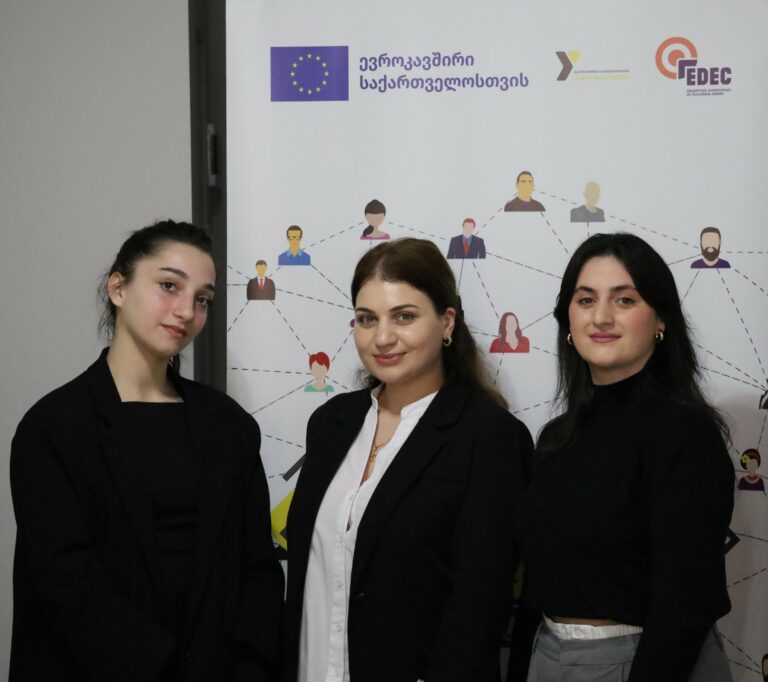
A hands-on approach to boost youth employment in Georgia
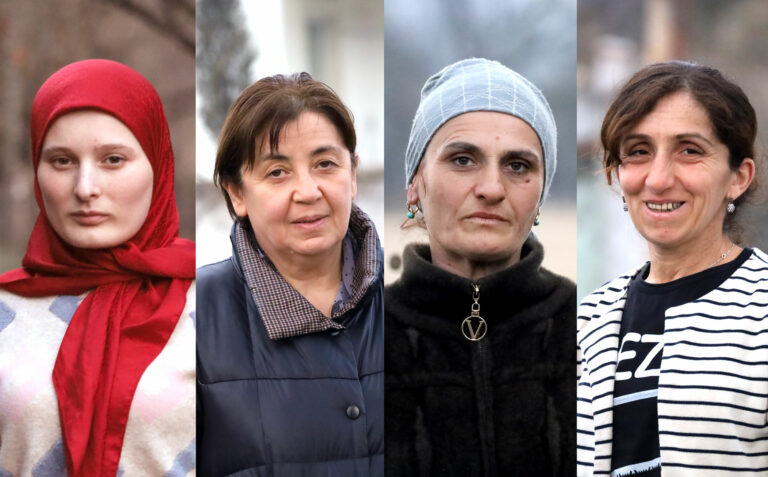
Taking health into their own hands: women’s empowerment in the remote villages of Georgia
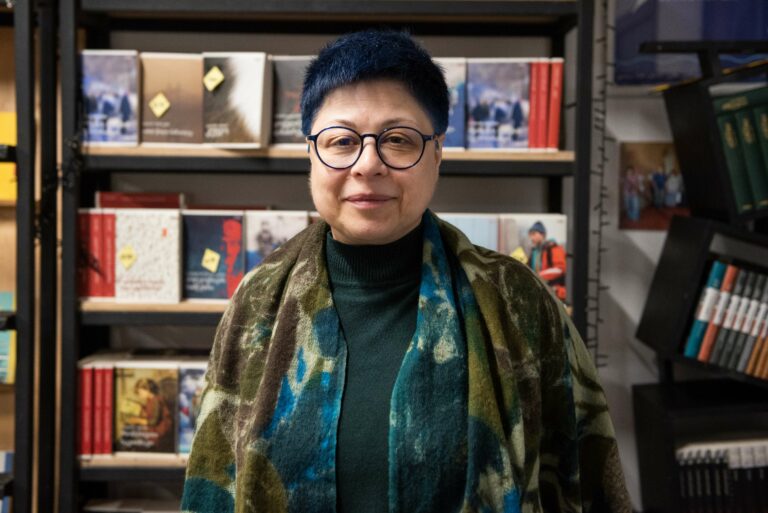
A woman publisher in a male-dominated industry – the path to a big dream

Be one step ahead of a hacker: check simple cybersecurity tips!
More campaign pages:
Interested in the latest news and opportunities?
This website is managed by the EU-funded Regional Communication Programme for the Eastern Neighbourhood ('EU NEIGHBOURS east’), which complements and supports the communication of the Delegations of the European Union in the Eastern partner countries, and works under the guidance of the European Commission’s Directorate-General for Neighbourhood Policy and Enlargement Negotiations, and the European External Action Service. EU NEIGHBOURS east is implemented by a GOPA PACE-led consortium. It is part of the larger Neighbourhood Communication Programme (2020-2024) for the EU's Eastern and Southern Neighbourhood, which also includes 'EU NEIGHBOURS south’ project that runs the EU Neighbours portal.

The information on this site is subject to a Disclaimer and Protection of personal data. © European Union,
